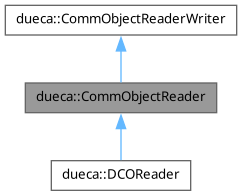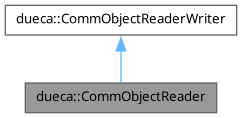dueca::CommObjectReader Class Reference
Class to access data in a channel without access to the class of that data. More...
#include <CommObjectReader.hxx>
Inheritance diagram for dueca::CommObjectReader:

Collaboration diagram for dueca::CommObjectReader:

Public Member Functions | |
| CommObjectReader (const char *classname, const void *obj=NULL) | |
| Constructor, for testing purposes, and for recursively accessing complex objects. | |
| template<typename T > | |
| CommObjectReader (T &obj) | |
| Templated constructor. | |
| ElementReader | operator[] (const char *ename) const |
| Return an element accessor based on the element name. | |
| ElementReader | operator[] (unsigned i) const |
| Return an element accessor based on index. | |
| ~CommObjectReader () | |
| Destructor. | |
 Public Member Functions inherited from dueca::CommObjectReaderWriter Public Member Functions inherited from dueca::CommObjectReaderWriter | |
| CommObjectReaderWriter (const char *classname) | |
| Constructor, for testing purposes, and for recursively accessing complex objects. | |
| ~CommObjectReaderWriter () | |
| Destructor. | |
| const char * | getMemberName (unsigned i) const |
| Return an element name based on index. | |
| const char * | getMemberClass (unsigned i) const |
| Return an element's class based on index. | |
| const char * | getMemberKeyClass (unsigned i) const |
| Return an element's key class based on index. | |
| MemberArity | getMemberArity (unsigned i) const |
| Return the member arity. | |
| size_t | getMemberSize (unsigned i) const |
| Get member fixed length, if available. | |
| const char * | getClassname () const |
| Return the classname of the currently written or read type; typically for debugging messages. | |
| size_t | getNumMembers () const |
| Determine the number of members in the object. | |
| const CommObjectMemberAccessBase & | getMemberAccessor (unsigned i) const |
| Directly reach the MemberAccess object. | |
| CommObjectReaderWriter & | operator= (const CommObjectReaderWriter &o) |
| assignment, needed for temporary copy MSGPACKtoDCO | |
Protected Attributes | |
| const void * | obj |
| Pointer to the currently accessed object, NULL if not used. | |
 Protected Attributes inherited from dueca::CommObjectReaderWriter Protected Attributes inherited from dueca::CommObjectReaderWriter | |
| DataClassRegistry_entry_type | entry |
| entry giving the class information | |
Detailed Description
Class to access data in a channel without access to the class of that data.
Note that using a DataReader is in many cases much more efficient, the CommObjectReader is only applicable for generic or data-agnostic reading.
Given the name of one of the Communication object's members, or the index of a data member (as returned by the DataClassRegistry::getMemberIndex call), an ElementReader can be created.
Constructor & Destructor Documentation
◆ CommObjectReader() [1/2]
| dueca::CommObjectReader::CommObjectReader | ( | const char * | classname, |
| const void * | obj = NULL ) |
Constructor, for testing purposes, and for recursively accessing complex objects.
- Parameters
-
classname Type of data; must match, or the result is nonsense! obj Pointer to the object.
◆ CommObjectReader() [2/2]
template<typename T >
|
inline |
Templated constructor.
- Parameters
-
obj Object to be read.
Member Function Documentation
◆ operator[]() [1/2]
| ElementReader dueca::CommObjectReader::operator[] | ( | const char * | ename | ) | const |
Return an element accessor based on the element name.
- Parameters
-
ename Name of the data member
◆ operator[]() [2/2]
| ElementReader dueca::CommObjectReader::operator[] | ( | unsigned | i | ) | const |
Return an element accessor based on index.
- Parameters
-
i Index of the data member
The documentation for this class was generated from the following file:
- /home/abuild/rpmbuild/BUILD/dueca-4.2.5-build/dueca-4.2.5/dueca/CommObjectReader.hxx